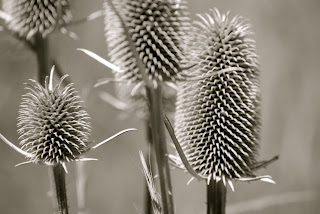 Dried thistles at China Camp State Park. See more at www.flickr.com/photos/dkkinsf
Dried thistles at China Camp State Park. See more at www.flickr.com/photos/dkkinsfI mostly had one thing in mind as I set out north with my camera. I wanted to find the sun. It had been cold, grey, overcast and windy all week long, to the point that I looked at weather reports from the entire Western Hemisphere and found that San Francisco temperatures were within 2 degrees of the lowest shown for the Americas. Outside the fog zone, Northern California sizzles. I wanted to find that perfect edge of cool sparkle. China Camp was it.
When I got there to look at the wide open space of marsh and bay, I thought of the first Epigona photo project at Utata.org. For the project, one must emulate the stye of the chosen famous photographer, and in this case it was Richard Misrach. I hadn't looked at his photos for several months, so only had a vague idea of what I might need to do to attempt his style. I took some shots with that idea in mind, then continued to explore through the viewfinder in my usual way.
As I took in my surroundings, I became fascinated by the character of a dry wetland. First off, the scent is different. It gave off the hot, baking fragrance of parched rock, not unlike the familiar scent from the chaparral of the nearby hills. Mixed in was a further sweetness, the honeyed perfume of thousands of tiny blossoms, smelling very much like alyssum. This scent came from the blooming dodder vines, whose rusty red-gold tangle lay in thick mats over large sections of the marsh. Walking out onto the marsh, I stepped on a springy surface of pickleweed, unhampered by the suck of thick black mud. When I got close to the streams running through the marsh, the wetness seeped up around my shoes before I could tell the ground gave way to water. No tell-tale extra growth of rushes warned me, though a small stand of them lined the stream banks.
The mutability of this region inspires me as a metaphor for a fundamental shift in identity. The name itself "wetland" doesn't lose meaning, as the bay tides wash over its outer limits. Streams meander through carrying water from springs in the hills. The hardy native plants thrive in this cycle, for drought is a recurrent phenomenon. The drought in a wetland does not create desert but something of its own, something beautiful and changed. As my life goes through upheaval and change, I can think of the fragrant grandeur of this dry marsh and learn from it. My identity may change in relation to my past, my social environment, or any other factor, but there is within me as well a natural drought resistance. The sun and soil, the movement of the tide, the passing mists, all offer sustenance for my growth. I do not have to live in the anxiety of a parched thirst, but have the opportunity to bloom as wetlands do in the absence of rain.